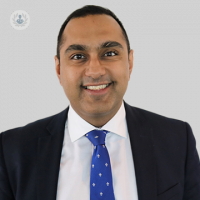Blocked nose: just a cold, or something more?
Autore:There's a reason it's called the common cold - we catch it so often we rarely stop to wonder whether our blocked nose could be anything else. But it's important to understand the rarer causes of a blocked nose and get a diagnosis if you're suspicious, as award-winning consultant ENT surgeon Mr Raj Lakhani explains.

When we get a blocked nose, we’re likely to put it down to having a cold. This makes sense – the average adult in the UK will catch the cold multiple times each year.
In most cases, the symptoms should resolve themselves after 7-10 days. For some people, it can take 3-4 weeks for their nose to fully return to normal. So if your symptoms last longer, or you find yourself getting a blocked nose frequently, it suggests that there could be something else going on. Let us look at the principal culprits:
Rhinitis
Rhinitis is an inflammation of the lining inside the nose. If it spreads to the sinuses, it can cause chronic sinus blockage, with symptoms lasting over a long period of time. Sometimes, as the swelling of the nasal lining becomes chronic, nasal polyps can form and they cause physical blockage to airflow through the nose. As well as a blocked nose, you’re likely to have other symptoms such as excess mucus,decreased sense of smell, and some discomfort in the face.
How rhinitis comes about is not always clear. In some cases we can identify a trigger, such as medication or an allergy. Sometimes rhinitis is caused by an infection.
Interestingly, there is good evidence that exposure to an extremely polluted environment leads to poorer nasal function, and more sinus problems. We already know that air pollution has a significant impact on chest conditions such as asthma. Since the lining in the nose is exactly the same as the lining found in the lungs, it is plausible that air pollution could have a similar impact on nasal and sinus health. Smoking can also cause problems with the lining of the nose and stopping smoking helps recovery and return to normal nasal function.
The good news is that after a careful assessment there are various treatments which can help decrease the symptoms from air pollution and decrease the impact of this on your nasal health.
Structural problems
Structural problems with the nose can be external or internal. Internally, the piece of cartilage which divides the nose into a left and right side – called the nasal septum – can be deviated. With a deviated septum, it’s less common to have the other problems such as excess mucus, decreased smell or pain in the face – you usually just feel a blocked nose, and usually it’s just on one side.
Problems with the structure of the nose can also be acquired through trauma or simply develop with age. This is because later in life, the support of the nose externally and internally starts to weaken. Problems may therefore start to occur or worsen as you get older.
It’s entirely possible that you have a structural problem with your nose without you knowing it. It doesn’t have to cause an obvious blockage all of the time, but sometimes a bad cold can highlight how blocked your nose is. You can live for a long time without really noticing that there’s a problem. That’s why it’s very common for us to see patients who developed a structural problem early on in life, but only seek advice later on.
What should I do if I keep getting a blocked nose?
It would be reasonable to try a nasal wash, which can be purchased from a pharmacist, or even an over-the-counter steroid-based nasal spray, to see if this helps prior to consulting. If there are any doubts however, it’s best to have a thorough history and examination with specialist ENT surgeon.
ENT surgeons deal with problems affecting the ears, nose and throat, and they have a range of ways to diagnose nose problems. The next article will look at how ENT surgeons diagnose a blocked nose, and what your treatment might look like.


